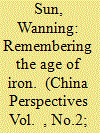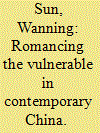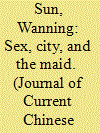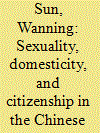|
|
|
Sort Order |
|
|
|
Items / Page
|
|
|
|
|
|
|
| Srl | Item |
| 1 |
ID:
184090


|
|
|
|
|
| Summary/Abstract |
It is difficult to conduct ethnographic inquiries into how China’s rural migrant individuals make decisions about their bodies and their sexual capital, and to date there have been few attempts to do so. Equally scant are examinations of the moral, cultural, and political frameworks that rural migrant workers who live in poverty and in the socio-economic margins use to make sense of sexual decisions and choices. This article starts with an ethnographic glimpse into the lives of some sex workers in Shenzhen, and proceeds to analyse a range of texts: a novella, a novel, a cluster of news stories (from both commercial and state media), and a feature story in a popular lowbrow magazine. Pitting these texts against sex workers’ own statements, as well as reading the texts in juxtaposition, brings into sharp relief the contradictions, connections, and coalitions between a range of discursive positions. The analysis suggests that a critical socio-economic framework, rather than a normative framework of transgression, may get us closer to understanding the emotional consequences of inequality. The analysis also demonstrates that for investigations into how inequality shapes intimacy, cultural texts may contain useful ethnographic insights that complement more traditional ethnographic methods.
|
|
|
|
|
|
|
|
|
|
|
|
|
|
|
|
| 2 |
ID:
139638


|
|
|
|
|
| Summary/Abstract |
The most common framework through which we understand media communication and political/social stability in China is that of hegemony and control. This characterization may have served us well in documenting how the mandate for stability often results in censorship, regulation and restriction, but it has two major faults: First, the focus on crackdowns, bans and censorship usually tells us something about what the party-state does not like, but does not convey much about what it does like. Second, it often obscures the routine ways the party-state and the market work together to shore up ideological domination and maintain stability. In this analysis of the policies, economics and content of a broad range of television programmes, I suggest that we look at the media and communication as an ideological-ecological system in order to arrive at a more nuanced understanding of the relationship between China’s media practices and its ongoing objectives.
|
|
|
|
|
|
|
|
|
|
|
|
|
|
|
|
| 3 |
ID:
114800


|
|
|
|
|
| Publication |
2012.
|
| Summary/Abstract |
'Dagong' means 'working for the boss', and bespeaks the commodification of labour. Over the past two and a half decades, a minor literary genre has emerged from this dagong community, documenting the crushing effect of the industrial machine on the body and soul of rural migrant workers. This paper considers the paradoxical process of class formation and class dissipation through the prism of the debates and commentaries surrounding workers' poetry from elite cultural institutions and worker-poets themselves. This discussion suggests that these commentaries and debates constitute both class articulations and disarticulations, and together they point to the precariousness of the formation of working-class consciousness in contemporary China.
|
|
|
|
|
|
|
|
|
|
|
|
|
|
|
|
| 4 |
ID:
139303


|
|
|
|
|
| Summary/Abstract |
Over the past few years we have witnessed a minor cultural phenomenon in China, with the production and enthusiastic reception nationwide of several television dramas about Chinese workers in the socialist decades. Set in the industrial plants of Liaoning in China’s northeast, once the industrial powerhouse of the socialist nation, these drama series centre on the dramatic transformation in workers’ experiences from 1949 to the start of economic reforms. In this paper I explore these series, asking: what does the smallscale production but enthusiastic reception of this genre tell us about the contemporary cultural politics of class? This paper addresses this question by (1) highlighting the key aspects of workers’ experiences with socialism as depicted in these television narratives; (2) considering the creative agenda of Gao Mantang, the script writer of the most successful industrial-themed television series; and (3) identifying some crucial ways in which the subjectivity of workers and other social groups in contemporary Chinese society intersect to shape the cultural politics of class. This discussion shows that television dramas have indeed become the basis of a widely accessible public forum that helps forge a renewed appreciation of the moral integrity of China’s working class, vent a widespread sense of injustice, and foster a certain degree of solidarity between workers and other social classes. At the same time, while television dramas about workers may hold significant potential for mobilising public support for the working class and advocating workers’ interests, this discussion also suggests that so far this potential has not been fully exploited
|
|
|
|
|
|
|
|
|
|
|
|
|
|
|
|
| 5 |
ID:
158263


|
|
|
|
|
| Summary/Abstract |
Several decades of economic reform have transformed China into one of the world’s most unequal countries. However, because this inequality has been studied primarily at the structural level, we know little about how it impacts on intimate relationships and affects individuals’ experiences of love and romance. This article engages with this question through a case study of ‘Love on the Assembly Line’, a series of ‘wedding photos’ featuring Chinese rural migrant workers, and the subsequent series of television reports of the same name, dating from 2012–13. It first examines the political-economic context of this minor cultural phenomenon, then examines current contestations over the meaning of love and romance, and finally documents the responses of rural migrant individuals themselves to the project. Combining ethnographic observation, in-depth interviews, and critical discourse analysis, this discussion goes some way towards demonstrating how inequality of emotion can be fruitfully studied, thereby advancing a new and alternative approach to researching inequality in China – one that views love/romance as a cluster of contested cultural narratives and discourses; as a social practice that involves a particular form of distributive injustice; as an integral part of class politics; and as the product of the interaction of these three realms.
|
|
|
|
|
|
|
|
|
|
|
|
|
|
|
|
| 6 |
ID:
102447


|
|
|
|
|
| Publication |
2010.
|
| Summary/Abstract |
Of the many rural migrant workers who go to Chinese cities as cheap labourers, the one who interacts most intimately with urban residents is the domestic servant. In fact, precisely because of this "intimate stranger" status, the figure of the "maid" has captured the imagination of the urban population. This fascination is evidenced by the plethora of television narratives centring on the fraught relationships between the rural migrant woman and her male employer. This paper analyses a range of television narratives from the genres of dramas and documentaries. It shows that in these narratives, sex functions as the metaphor of social inequality between two social groups. It shows that if we explore how love, romance and marriage are constructed, we may gain some insight into processes of social and ideological contestation in the domain of cultural production.
|
|
|
|
|
|
|
|
|
|
|
|
|
|
|
|
| 7 |
ID:
083207


|
|
|
|
|
| Publication |
2008.
|
| Summary/Abstract |
The widespread phenomenon of outsourcing domestic work has profoundly altered the household life styles of urban families and reworked the division of labor at home. However, the extent to which urban consumers depend on the labor and service provided by the rural migrant women is by no means indicative of the degree of "harmony" and civility between the two groups. While the Chinese news media, with its urban and middle-class clientele base, see little chance of selling pictures or headlines featuring the everyday struggles of disenfranchised social groups such as rural migrant women who are employed as domestic workers, they have exercised unprecedented freedom in publishing stories about criminality and sexuality. With the figure of the maid becoming increasingly ubiquitous in urban households, urban consumers of paid domestic work also get a regular dose of "maid stories" in their everyday media consumption. Combining ethnography with detailed media analyses, this article examines the range of gendered positions and modes of sexual subjectivity which have been articulated in these stories. It shows that in a number ways the emergence of a new sexual sensibility for urban, middle-class men is contingent on the exclusion of subject positions for, and the derogation of, the "other" woman-the "intimate stranger" at home.
|
|
|
|
|
|
|
|
|
|
|
|
|
|
|
|
|
|
|
|
|